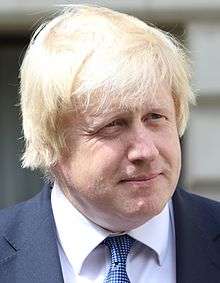Helen Tracy Lowe-Porter
Helen Tracy Lowe-Porter (June 15, 1876/1877, Towanda, Pennsylvania – died April 26, 1963, Princeton, New Jersey[1][2]) was an American translator, best known for her pioneering translations of the works of Thomas Mann.[3]
Career
Helen Tracy Porter was the daughter of Clara (née Holcombe) and Henry Clinton Porter. She was the niece of Charlotte Endymion Porter, editor of Poet Lore, a poetry journal, and an expert on Shakespeare and Elizabeth and Robert Browning.[4] She married the paleographer Elias Avery Lowe in 1911 and took the married name of Lowe-Porter. The couple lived in Oxford; after 1937, their residence was in Princeton, New Jersey. One of their daughters, Frances, was the maternal grandmother of London mayor Boris Johnson. For more than two decades, Lowe-Porter enjoyed exclusive rights to translate the works of Thomas Mann from German into English. She was granted these rights in 1925 by Alfred A. Knopf.
In her essay "On Translating Thomas Mann", Lowe-Porter said that while it is not so important that the translator be a great scholar of the foreign language, as few literary practitioners are really and truly bilingual, it is very important indeed that he/she be a master of the resources and subtleties of his/her own.[5] She also said, in her note to her translation of Der Zauberberg (The Magic Mountain):
"The violet has to be cast into the crucible....The organic work of art must be remoulded in another tongue....Since in the creative act word and thought are indivisible, the task is one before which artists shrink and logical minds recoil." (Translator's note to The Magic Mountain. New York, Alfred A. Knopf, 1927)
She also wrote an original play, Abdication, which received its first production in Dublin in September 1948.[6]
Thomas Mann translations
Lowe-Porter's translations of Thomas Mann works include the following (dates in brackets refer to the German publication, the dates after to the English-language translations).
- Buddenbrooks [1901] 1924
- The Magic Mountain [1924] 1927
- Death in Venice [1913] 1928
- Mario and the Magician [1930] 1931
- Joseph and His Brothers, comprising:
- I The Tales of Jacob [1933] 1934
- II Young Joseph [1934] 1935
- III Joseph in Egypt [1936] 1938
- IV Joseph the Provider [1943] 1944
- Stories of Three Decades 1936
- The Beloved Returns [1939] 1940
- The Transposed Heads [1940] 1941
- Essays of Three Decades 1947
- Doctor Faustus [1947] 1948
- The Holy Sinner [1951] 1951
- A Sketch of My Life 1960
Critical reaction
For decades, Lowe-Porter's translations of Mann were the only ones that existed in the English-speaking world, aside from Herman George Scheffauer's. At least one contemporary review misidentified Lowe-Porter's gender as male.[7] Mann expressed his appreciation to Lowe-Porter for her work, nicknaming her "die Lowe", but also added the caveat, "insofar as my linguistic knowledge suffices". Critic Theodore Ziolkowski said of Lowe-Porter's translation of Mann's Buddenbrooks:
"Lowe-Porter provided a valuable service by making Mann's novel initially accessible to the English and American publics."[8]
Other commentaries on her translations has included the following:
"The Lowe-Porter translations of Thomas Mann, despite occasional inaccuracies almost inevitable in works of such length and complexity, convey the ironic and pyrotechnical style of the original with great effectiveness." [9]
"Despite minor inaccuracies, misreadings, and possible errors of judgment (to which all translators are subject, whatever they may say), Lowe-Porter's translations are widely beloved and have become classics in their own right, to stand beside Constance Garnett's Tolstoy and Dostoyevsky and Scott Moncrieff's Proust. She is indisputably, in quantity as in quality, one of the great translators of our time."[10]
"Thomas Mann and Proust were lucky in their translators."[11]
Subsequent Mann translators have included Kenneth Burke, David Luke, and John E Woods.[8] A new assessment of the English translations of Thomas Mann within the framework of modern descriptive-analytical translation studies has been provided by David Horton in his study Thomas Mann in English. A Study in Literary Translation. Bloomsbury. London, New Delhi, New York, Sydney, 2013. ISBN 978-1-4411-6798-9. Horton seeks to move beyond an exclusively error-based evaluation of literary translation, examines various salient dimensions of versions by Lowe-Porter, Luke and Woods, and demonstrates that Lowe-Porter's approach to translation was in keeping with the practice prevalent at the time.
References
- ↑ "Died: Helen Tracy Lowe-Porter, 86". Time. May 3, 1963. Retrieved 2008-10-24.
- ↑ pp. 428-429, Notable American Women: The Modern Period: a Biographical Dictionary, Barbara Sicherman, Carol Hurd Green, Harvard University Press, 1980; ISBN 0674627334.
- ↑ Robertson, Ritchie (2002). The Cambridge Companion to Thomas Mann. Cambridge University Press. pp. 235–47. ISBN 0-521-65370-3.
- ↑ Pennsylvania Literary Biographies, Pennsylvania State University
- ↑ John C. Thirwall, In Another Language: A Record of the Thirty-Year Relationship between Thomas Mann and His English Translator, Helen Tracy Lowe-Porter. New York, Knopf, 1966.
- ↑ Hugh Smith (September 28, 1948). "Abdication Bows In Dublin Theatre; Mrs. H. T. Lowe-Porter's Play Produced by Hilton Edwards - MacLiammoir Tops Cast". New York Times. Retrieved 2008-10-25.
- ↑ "Teutonic heights (Thomas Mann's The Magic Mountain reviewed in The Guardian, July 1, 1927)". The Guardian. September 7, 2002. Retrieved 2008-10-24.
- 1 2 Theodore Ziolkowski (April 18, 1993). "The Earthier Side of the Buddenbrooks". New York Times. Retrieved 2008-10-24.
- ↑ William Arrowsmith & Roger Shattuck, eds. The Craft & Context of Translation, a Symposium. University of Texas Press. Austin, 1961.
- ↑ Viktor Wakovsky: Artwork, Artifice, Forgery: The Translator's Craft. Fratelli Verlag, San Francisco, 1983.
- ↑ Jean Cocteau, Diary of an Unknown, New York: Paragon House, 1988.
